BEGINNINGS
Part One <> Early Years
Victor Harvey Briggs III was born in Hampton, in West London. His father had been an American, Capt. Victor H. Briggs Jr., commander of C Company, 1st Infantry division. Highly respected by his men, Captain Briggs led them through the hell of Omaha beach on June 6th, 1944 where he was awarded the Distinguished Service Cross for gallantry. On November 17th 1944, he was killed in action in Northern France, before his only child was born. Young Vic was raised by his mother, the former Sheila Mills, who lived with her parents Alexander and Caroline Mills in Feltham, an undistinguished town about 15 miles from the heart of London’s West End.
As a child he was encouraged, like many children of the time, to take piano lessons. Although he did not continue for very long he gained a basic understanding of written music and a musical ear that would serve him well in his life to come. His mother was an avid fan of musicals and a sound track album of The King and I, Carousel or Oklahoma was always on the record player.
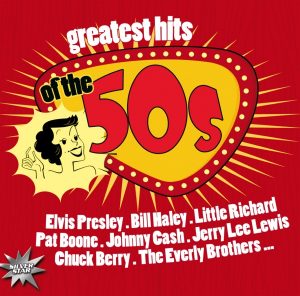
England was a grim place in the years following the Second World War and Vic, like many of his contemporaries, was always listening to the radio as a way to escape some of the gloom that surrounded peoples’ lives in the early ’50’s. When he was ten years old Vic heard Rock Around the Clock by Bill Haley and the Comets. It was thrillingly unlike anything he had ever heard before and he began to collect records by Bill Haley, Elvis Presley and Little Richard. The wild abandon of the music of Little Richard quickly made him Vic’s favorite rock ‘n’ roll artist.
At 12 years, Vic began to attend Hampton Grammar School. In spite of its very staid middle class traditions and rigid attitudes, and the fact that the headmaster and teaching staff were vehemently opposed to rock music and the culture that surrounded it, pupils from that school had a huge influence on the rock music scene in years to come. Among Vic’s contemporaries were Paul Samwell- Smith and Jim McCarty (The Yardbirds), Murray Head (movie actor and singer One Night in Bangkok) and Brian May (Queen).
The skiffle craze was in full swing and for Christmas 1957, Vic’s mother gave him a guitar. He quickly mastered a few chords and within months was playing with semi-pro bands. By the time he was sixteen he was playing two or three nights a week with a band called the Cruisers Rock Combo. One night in February of 1961, Big Jim Sullivan who was the lead guitarist with Marty Wilde (one of the early Brit teen idols) came to sit in with the Cruisers. Impressed with Vic’s talent, Jim became his mentor; a role Jim also fulfilled for Ritchie Blackmore who lived only a few miles from Feltham. Big Jim was instrumental in getting Vic’s first pro gig with a band called The Echoes. Although Vic only spent three weeks with the band (before his mother made him quit and go back to school) during that time he met many of the top names of Brit rock of that time including Cliff Richard and the Shadows and Billy Fury.
Ian Hines, The Echoes pianist, had been working in Hamburg a short time previously. Ian introduced us to a few. “This is Rory Storm, he has a band called The Hurricanes up in Liverpool. This is Ringo, his drummer.”
Vic remembers: “And that’s who it was, Ringo Starr in his days before the Beatles.”
Rory and Ringo invited The Echoes to come and jam at the famous Cavern Club in Liverpool. There Vic met Gerry and the Pacemakers and even The Beatles, then still with Pete Best on drums.
Vic’s experience with The Echoes proved to him one thing. What he wanted in life, more than anything, was to be a musician.
Although Vic’s mother forced him to go back to school, his heart was not there and his schoolwork fell by the wayside. He went back to playing semi pro bands. In April of 1962 he was invited to rejoin The Echoes for one gig to back up Jerry Lee Lewis who was making a comeback in the UK. It was an incredible experience actually playing guitar for one of his boyhood heroes.
In the summer of 1962 Vic played for some months with a band called Peter Nelson and The Travelers. Although they were not a great band, they eventually morphed into Peter’s Faces who came close to breaking into the charts in 1965. Two of the members, Peter Nelson and Robin Shaw, became the nucleus of The Flowerpot Men who had a big hit in 1967 with Let’s go to San Francisco, while later Robin Shaw and Tony Hall (also from The Travelers) were still touring with Cliff Bennet and the Rebel Rousers. During the time Vic was with them, the drummer broke his arm. They brought in a substitute drummer called Mitch Mitchell , later to be one of the members of the Jimi Hendrix Experience. Mitch didn’t play with The Travelers for very long but he was there for a band photo session, one of the photos from which is in his book: With The Experience.
Around that time, Vic began to frequent a music store a short bus ride away in a town called Hanwell. The store was started by a drum teacher named Jim Marshall and was renowned for giving support and a fair deal to struggling musicians, as well as for having a great selection of gear. Shortly after that, Jim Marshall began Marshall Amplification , one of the most successful companies in Rock history. After Hampton Grammar politely asked Vic if he would not return to school in August of 1962, his mother realized that there was nothing she could do but allow him to become a professional musician.
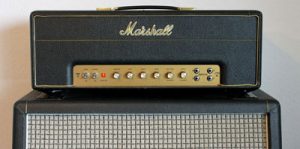
Vic’s first “real” pro gig was with the Shel Carson Combo starting in September of 1962. The band spent the winter of ‘62/63 (one of the coldest on record) miserably touring England and Scotland in an unheated van. In April of 1963 they went to Hamburg, Germany, where they had a residency at the Top Ten Club. The Beatles were just around the corner at the Star Club. At the end of the German tour, the band received an offer to go to Italy and Vic quit the band. The band stayed in Italy, changed their name to The Rokes and became the top band in Italy throughout the ‘60’s.
Between May of 1962 and February of 1965, Vic played with several different bands, including the Laurie Jay Combo, The Fleerekkers and Peter’s Faces. He also went back to Germany for two months as a substitute with a band from Glasgow (John O’Hara and the Playboys), whose lead guitarist had been badly injured in an automobile accident. These were not great times. It was hard work playing uninspiring gigs, lots of traveling, long hours (in Germany, playing up to 8 hours a night!) with little success and even less money. But it was a time for paying dues. Vic used these years to refine a guitar technique that, in 1967l, would lead no less a figure than Jimi Hendrix to name him as one of his three favorite guitarists (along with Eric Clapton and Jeff Beck). He also became immersed in the study of arranging and writing music.

In January of 1965, success finally began to come his way. He was asked to rejoin The Echoes, the same band his mother had forced him to leave in September of 1961. In the interim, The Echoes had become the back up band for hit making chanteuse, Dusty Springfield. On February 14th 1965 (his 20th birthday) Vic flew to Ireland to begin his first tour with Dusty.
These were heady times to be involved in the British music scene. Vic began to frequent the ‘in clubs’ in London’s West End where all the top bands, models, artists and other characters would hang out.
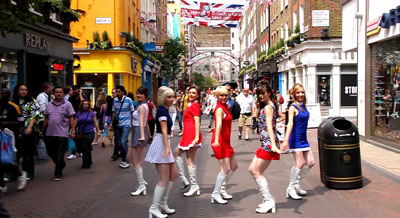
Life was a constant party, with nightly musical jams and parties until daylight being the norm. Vic became friendly with an outstanding keyboardist named Brian Auger. Brian had moved from the jazz world where he had been an award winning pianist to be part of the growing R & B scene which was THE happening place to be on the Brit music scene.
Brian and Vic took an immediate liking to each other and became friends, spending endless time in the pre-dawn hours at Brian’s flat, drinking gallons of tea and swapping music stories and Goon Show jokes. When Dusty wasn’t working, Vic would go and sit in with Brian’s band (The Trinity). In August of 1965, Brian became one of the founding members of The Steampacket with Long John Baldry , Rod Stewart and Julie Driscoll. He asked Vic if he would join.
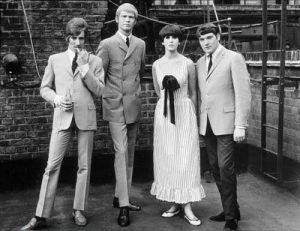
The next year was a whirlwind of gigs, traveling and partying. The musical standards that Brian set were very high and Vic had to stay on his toes and keep practicing to stay with the program. Slowly the Steampacket began to disintegrate. Rod Stewart left in March of 1966. After the band spent the month of June in a club in San Tropez in the South of France, Long John left. It then became Julie Driscoll and Brian Auger and the Trinity.
During that summer, Brian and Vic recorded an album with Johnny Halliday, the top French male singer. One of the songs Noir c’est Noir (Black is Black) went to the top of the French charts.
On September 28th, 1966 Brian and the Trinity were playing at the Scotch of St James. Chas Chandler came in with a very unusual looking black guy with wild hair. Asking if he could sit in with the band, he borrowed Vic’s amplifier and proceeded to wow the crowd.
“At that time I was playing an unusual Marshall stack that they had developed. It had twelve six-inch speakers with a hundred watt amplifier. Jimi plugged in his Strat (which was right handed but strung left handed) and turned every control on the amp up to eleven! I was horrified. For one thing I was sure this would blow out the speakers, I had never turned the volume up past five. And for another, The Scotch of St. James was about twice the size of the average living room. What was this guy trying to do? He must have seen the look of horror on my face because he immediately said to me “Don’t worry man, I turn it down on the guitar”.
This was Jimi Hendrix. He and Vic became friends that evening, partly based on their mutual admiration for each other’s playing.
On October 18th, the band was at L’Olympia, the top music hall in France at the time for a show with Johnny Hallyday. The Jimi Hendrix Experience had also been added to the bill. Shortly before the show, Vic was approached by Mike Jeffrey, who was Jimi’s co-manager (with Chas Chandler). Mike was also the manager for Eric Burdon and The Animals and he asked Vic if he would like to join The Animals.
Vic immediately agreed. After giving notice to Brian, Vic joined The Animals in November of 1966.
Part Two <> The Animals
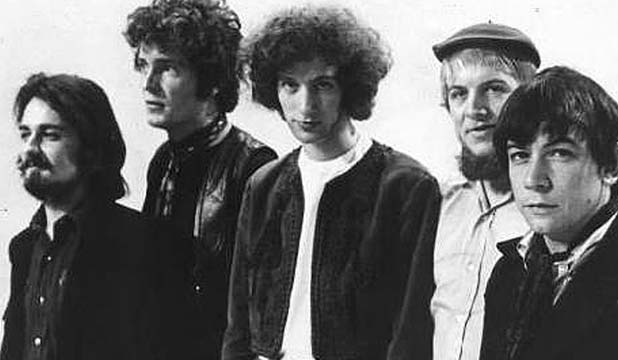
Vic’s bandmates were Eric Burdon (vocals), Barry Jenkins (drums), John Weider (guitar) and Danny McCulloch (bass). John had played with Vic in the Laurie Jay Combo in 1963 and regarded Vic as somewhat of an older brother. Their friendship has continued for many years.
After some weeks of rehearsal, The New Animals (that is, the version with Vic in it) made their debut on December 2nd 1966 at the University of Birmingham. The band also began recording, making their first single When I was Young at Olympic studios, also in December.
In January, Mike Jeffrey cut a deal for Eric to sing a song in the upcoming James Bond spoof Casino Royale. The song was a Bacharach/David song. Vic explains:
“I was to arrange it. I went up to see Burt Bacharach at his hotel in the West End. Even though it was the middle of winter Burt looked tanned and handsome, having just come from LA. I wrote some horn parts and we recorded the song. Everyone was there. Tom Wilson (The Animals producer), Mike Jeffrey, Burt and Angie Dickinson and Burt’s song writing partner, the great lyricist Hal David . Everyone was very happy with the track and congratulated me. I was quite pleased with myself. It was the first time that a written arrangement of mine had been recorded.”
However, when it came time for Eric to overdub the vocal, he hadn’t learned the song properly and Hal David vetoed its use in the movie.
After a few weeks of doing gigs around the UK and Europe, it was time for the experience of a lifetime: a tour that would take the band around the world with concerts in the USA, Canada, Australia and New Zealand. They left for New York on February 2nd 1967.
The tour was hard going at first, slogging through the cold and dealing with unappreciative audiences in New England, Canada and the Midwest. But when the band arrived in California there was an immediate feeling of relief, a sense of ‘coming home’. There in Los Angeles, the band recorded their first album, Winds of Change. The hit San Francisco Nights (with Vic playing lead guitar) was taken from this album.
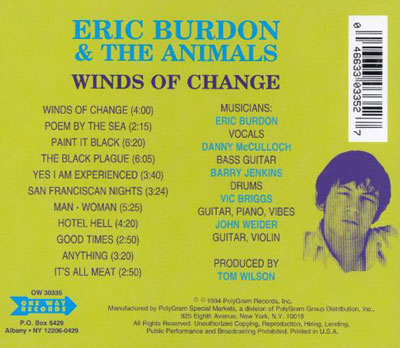
Indian music had become very popular on the West Coast and Vic was able to buy some great albums including some by India’s top Sarod player Ali Akbar Khan who had taken up residence near San Francisco.
On their visit to San Francisco, the Animals played an unscheduled gig at the Avalon Ballroom in San Francisco where they met the Grateful Dead. Vic became friends that night with Bill Kreutzman who today only lives ten minutes drive away on the island of Kauai.
After touring Australia and New Zealand, the Animals returned to the UK in May where the ‘Summer of Love’ was just beginning.
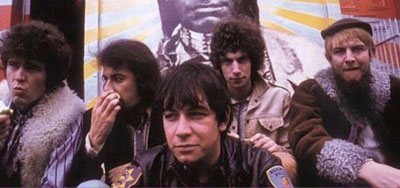
Vic Briggs in talks with Radio 2UW in Sydney, Australia, in April 1967.
Eric found out that the Monterey Pop Festival was going to take place and had Mike Jeffrey move heaven and earth to get The Animals on the festival. And so the band flew back to LA on June 15th, appearing on Friday June 16th at the festival. On that trip, the Animals also played two legendary California venues for the first time: The Fillmore Ballroom in San Francisco and the Whiskey a Go Go in Hollywood.
After spending August and September back in London, the Animals were back in California in October. Here they recorded their second album, The Twain shall Meet. By now Vic’s arranging skills were growing in leaps and bounds and are quite evident on this album where he wrote for strings, horns and even the band of the Scots Guards. This album produced two hit singles: Monterey (again with Vic playing blistering lead on a Danelectro electric sitar) and Sky Pilot.
December found the Animals back home in London. Except that it didn’t feel like home anymore. The “Summer of Love” had come and gone. The Brits had very little interest in psychedelic music and many felt the Animals were suspect because of their oft-expressed attraction for California. It was also becoming obvious that there was gross financial impropriety in the Animals management.
In January 1968, the band returned to LA, this time to stay. But something had changed. The Summer of Love had gone from California as well. After the idealism of 1967, 1968 was to be a year that would bring increasingly hostile demonstrations against the Vietnam War, as well as the assassinations of Martin Luther King and Robert Kennedy.
Friction started between the band members and it soon became obvious that the writing was on the wall. Eric brought Zoot Money into the band, but Zoot’s presence, lovable guy and great musician that he is, only hastened the bands demise. After recording the New Animals third album Everyone of Us Vic and Danny McCulloch left the band in July of 1968.
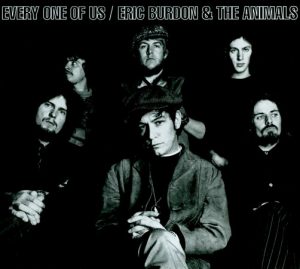
For a long time, Vic had wanted to try his hand as an independent arranger and producer. His work with The Animals had already given him a reputation among the musicians of LA and so he began to work as a producer as well as an independent arranger for other producers. His first album project as a producer was with Danny McCulloch for Danny’s album Wings of a Man.
During the late ‘60’s, the LA recording scene was THE place to be. An enormous string of hits had been produced by such artists as The Beach Boys, The Byrds, Sonny and Cher, The Monkees and many others.
At the heart of most of these recordings was an elite group of musicians known as The Wrecking Crew. Although it was an ever changing group, some of these musicians became famous in their own right; musicians like Hal Blaine, Carol Kaye, Michel Rubini and many others.
Vic chose a group of musicians that he felt he could work with and they became the core of his record dates. They were:
Jim Gordon – drums, Lyle Ritz – bass, Michel (Mike) Rubini – piano, David Cohen – guitar, Gary Coleman – percussion.
Since these musicians were in demand and not always available, Vic also used Hal Blaine, John Guerin – drums, Carol Kaye – bass, Alan and Gene Estes – percussion, Al Casey, Mike Deasy, and Don Peake – guitars.
From the wealth of fine horn players in Hollywood, Vic would often use Plas Johnson and Gene Cipriano on reeds, Vince DeRosa, Bill Hinshaw, Art Maebe and Henry Sigismonti on French Horns. And of course Vic’s long suffering copyist, Virgil Evans on trumpet, as well as Tony Terran who was featured on Hotel Hell, a cut from the Animals’ Winds of Change album. Vic’s concertmaster for the string section was inevitably the unflappable Jimmy Getzoff, concertmaster for the Glendale Symphony.
“It was quite incredible. Here I was in LA working with jazz guys that I had idolized for years. I was in demand and just having a great time. I cannot express what an honor and privilege it was for me to play with these great musicians at such an exciting time.”
As well as Danny McCulloch, Vic produced albums with other ex-animals Zoot Money (Welcome to My Head) and Hilton Valentine (It’s all in your Head). He also produced an album with ex Music Machine lead singer Sean (TS) Bonniwell (Close).
“In May of 1969, I was offered a job with Capitol Records as a staff producer. Although Capitol had musical giants like The Beach Boys, The Beatles, The Band and The Steve Miller Band on their roster, they had acquired them by luck rather than musical or business acumen. Located at the intersection of Hollywood Boulevard and Vine Street in Hollywood, Capitol still had the aura of a 50s record company. They were located in the round Capitol Tower that was supposed to represent a stack of records and was their corporate logo.
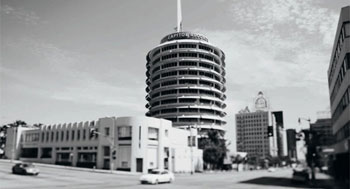
Everything about Capitol was much more set up to handle Frank Sinatra, Dean Martin and Peggy Lee than the rock bands that were now their bread and butter. Someone decided that they needed new blood in the A& R department and they offered me a contract. I cut a very lucrative deal with them. That was the only redeeming quality about my time with Capitol. Everything else I hated.
On Tuesday, December 15, 1969, my boss at Capitol Records called me into his office. “Vic,” he said, “I owe you an apology. All the bad things that I said would not happen if you came to work here have happened. I’m sorry to tell you we’re going to have to let you go. Oh, and by the way, Merry Christmas.” I thought “Merry Christmas to you too, m*#$% f%^$#,” but said nothing.
On the way home I was devastated. How was I going to maintain my lifestyle without my salary from Capitol Records? And yet, after reaching home, I found a sense of relief creeping over me. No longer would I have to go and work in this awful, constricting corporate situation. No longer would I have to feel the constant ache in my cheeks from trying to smile when I was crying inside.”
